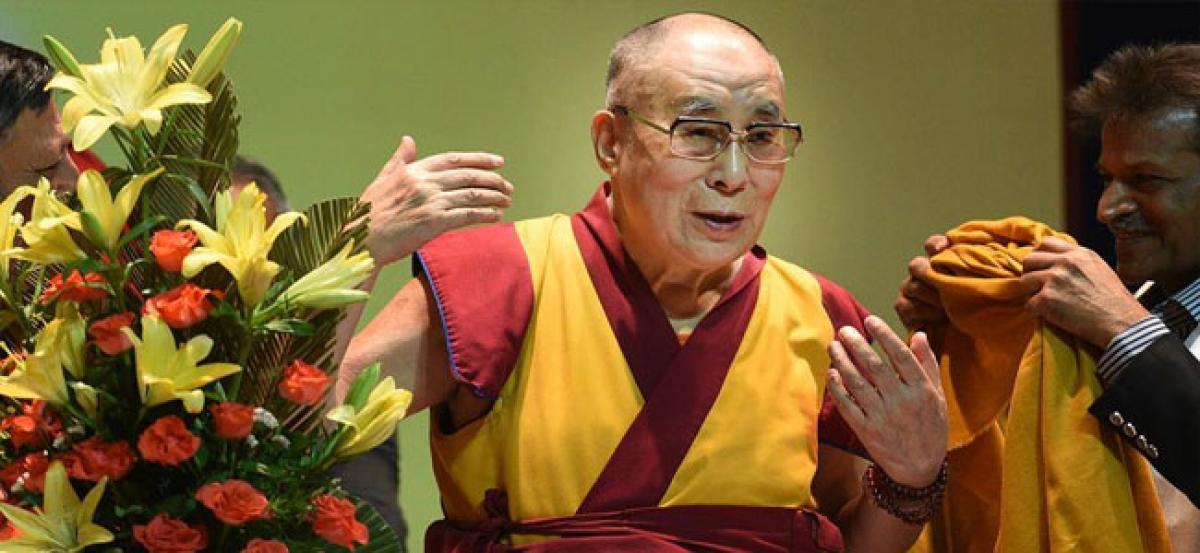Live
- Bhumi puja performed for Adani Junior College building
- Did Allu Arjun fight for India at border, asks CM Revanth
- CM Revanth, officials to inspect residential, Gurukul hostels today
- SSBs to be set up soon in Nellore
- TGPSC all set for holding Group-II exams
- Commissioner directs officials to ensure safe water supply amid heavy rains
- Youth urged to donate blood to save lives
- National Energy Conservation Week from today
- Tourism projects to be put on fast track as VMRDA sets targets
- AI in KGBVs to empower students, build competencies
Just In

Tibetan spiritual leader the Dalai Lama on Sunday called for the revival of the ancient Indian traditions and for integrating them with the modern education system, saying doing so would help fight issues such as war and global warming.
The Tibetan spiritual leader says the greatness of the Indian civilisation is its spiritual brotherhood and harmony.
Tibetan spiritual leader the Dalai Lama on Sunday called for the revival of the ancient Indian traditions and for integrating them with the modern education system, saying doing so would help fight issues such as war and global warming.
The 82-year-old monk was delivering a lecture on ‘Role of Ethics and Culture in Promoting Global Peace and Harmony’ in New Delhi. The programme was organised by Nehru Memorial Museum and Library, which aims to preserve the history of the Indian independence movement, and Antar-Rashtriya Sahyog Parishad, a non-political society founded in 1978 with an aim to keep close interaction with people all over the world.
“Serious discussions on how to include the ancient Indian traditions in educational system should begin. India has the capability to combine modern education with its ancient traditions to help solve problems in the world,” the Dalai Lama said.
The greatness of the Indian civilisation is its spiritual brotherhood and harmony, he said, adding, it has produced the greatest philosophical thinkers and preachers who gave rise to the Nalanda tradition of Buddhism based on reason and logical conclusion.
A vast amount of what came to comprise the Tibetan Buddhism, stems from the teachers and traditions at Nalanda.
Nalanda is known for its Buddhist sites and monuments.
The Nalanda University, which attracted students and teachers from across the Indian subcontinent as well as China, Central Asia, and Tibet, was the most important Buddhist centre of learning in ancient and medieval India.
Citing quantum physics, which describes nature at the smallest scales of energy levels of atoms and subatomic particles, the Dalai Lama said the concept was explained 2,000 years ago by the Indian philosopher Nagarjuna.
“Buddha was an ancient Indian scientist. I consider myself as half monk and half scientist,” he said, referring to his deliberations with scientists.
Terming war, terrorism and religious violence products of materialism, the spiritual leader expressed his sadness over the violence against the Rohingya Muslims in Myanmar.
The Rohingya, who had lived for centuries in the Buddhist-majority country, are one the most persecuted people in the world. Myanmar had denied them citizenship since 1982, effectively rendering them stateless. Nearly 70,000 Rohingya people had to flee Myanmar to Bangladesh after a surge in violence and military crackdown on in August least year.
He expressed concern over global warming, explaining that the amount of snowfall in Dharamshala, the seat of the Tibetan government in exile, has reduced worryingly over the years.
“Global warming has made life difficult for many people.”
The Dalai Lama also said that Tibet may remain part of China if its geographical, cultural and linguistic autonomy is guaranteed. “Tibet will benefit from economy of China.”
Citing the success Chinese people achieved in maintaining their identity through hard work, he suggested Indians around the world, too, should spread their ancient traditions.
“Try to revive ancient Indian traditions. Actual change does not come from prayer, it comes from action. Wherever Chinese go, they have a ‘China Town’. Why not an ‘India Town’ by Indians?”
The programme was the first the Dalai Lama participated in the national capital, since an event to mark 60 years of his exile in India was cancelled and another was moved to Dharamshala in early March. He was to attend both the events.
That development had happened in the backdrop of a media report that the Indian government had directed its senior functionaries to skip events organised by Tibetans.
At the outset of the 1959 Tibetan uprising, the Dalai Lama fled to India in March that year to escape a Chinese crackdown.

© 2024 Hyderabad Media House Limited/The Hans India. All rights reserved. Powered by hocalwire.com







